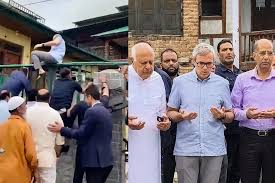Kashmir Martyrs’ Day Row: Stalin to Akhilesh to Mamata, Opposition slams BJP over confinement

On July 13, political tensions escalated nationwide as Opposition leaders accused the BJP-led Centre of confining several Kashmiri politicians on Kashmir Martyrs’ Day. The day honors 22 civilians who died on July 13, 1931, during protests against the Dogra regime. It has been a solemn date in Jammu and Kashmir’s political calendar. However, this year, the focus shifted to allegations of forced confinement and democratic suppression.
What Triggered the Controversy?
Kashmiri leaders from parties like the People’s Democratic Party (PDP) and the Jammu and Kashmir National Conference (NC) said authorities stopped them from visiting Srinagar’s Martyrs’ Graveyard. PDP chief Mehbooba Mufti shared photos of locked gates outside her residence, claiming she was under house arrest.
She posted on social media:
“On the day we honor martyrs who stood against tyranny, we are locked inside. This shows how far democracy has declined under the current regime.”
Her message sparked strong criticism from national Opposition figures.
MK Stalin: “This is Not Democracy, This is Dictatorship”
Tamil Nadu Chief Minister MK Stalin called the reported restrictions an abuse of power. He said the government’s actions disrespected the historical significance of the day.
“How can leaders be locked in on a day meant to remember martyrs? This shows the BJP’s intolerance for dissent. Democracy cannot exist behind closed doors.”
Stalin urged the Centre to respect the democratic values that the martyrs fought for.
Akhilesh Yadav: “India’s Soul is Being Stifled”
Akhilesh Yadav, chief of the Samajwadi Party, expressed deep concern. He said India’s strength lies in its right to protest, remember, and speak out.
“Martyrs’ Day belongs to the people. If leaders can’t even offer tributes, then the system is clearly failing. India’s soul is being stifled.”
He warned that suppressing political voices could isolate the people of Kashmir further.
Mamata Banerjee: “BJP is Erasing History Through Fear”
West Bengal Chief Minister Mamata Banerjee also reacted sharply. She accused the BJP of rewriting history by silencing regional voices.
“Martyrs’ Day doesn’t pose a threat to security. It represents sacrifice and struggle. The BJP is erasing history through fear and force.”
She demanded the release of all leaders and called for the restoration of democratic space in Kashmir.
What the Government Said
The BJP did not release an official statement. However, some officials in the Union Territory cited security concerns. They claimed past events on Martyrs’ Day had led to tension, and the restrictions were a precaution.
Critics rejected this justification. They said the government cannot repeatedly use security as an excuse to deny fundamental rights. Human rights groups also questioned the fairness of the action.
Is This Part of a Larger Pattern?
This isn’t the first time Kashmiri leaders have faced restrictions. Since the abrogation of Article 370 in 2019, multiple leaders have reported detentions or limitations on movement.
Observers say the government has slowly chipped away at civil liberties in the region. Political gatherings remain rare, internet blackouts are common, and public dissent is often met with police presence.
The removal of Martyrs’ Day as an official holiday after 2019 adds to concerns. Critics argue the government is trying to erase historical narratives that don’t align with its agenda.
Opposition Unity Gathers Momentum
The strong response from leaders like Stalin, Akhilesh, and Mamata points to growing coordination among Opposition parties. They have signaled that civil liberties and federalism will be key campaign themes ahead of the 2026 general elections.
By speaking out on Kashmir, a region traditionally seen as politically sensitive, these leaders are taking a unified stand. Their support for Kashmiri politicians reflects a wider push to challenge the BJP’s handling of dissent and governance.
Conclusion
This year’s Kashmir Martyrs’ Day has highlighted the tensions between national leadership and regional voices. While the day should have been about honoring sacrifices, it turned into a debate on the state of Indian democracy.
The Centre’s silence has raised further questions. Meanwhile, Opposition leaders have made it clear they won’t stay quiet when civil liberties are at stake.
As India looks ahead to 2026, the political fault lines in Kashmir may become central to the national conversation.






